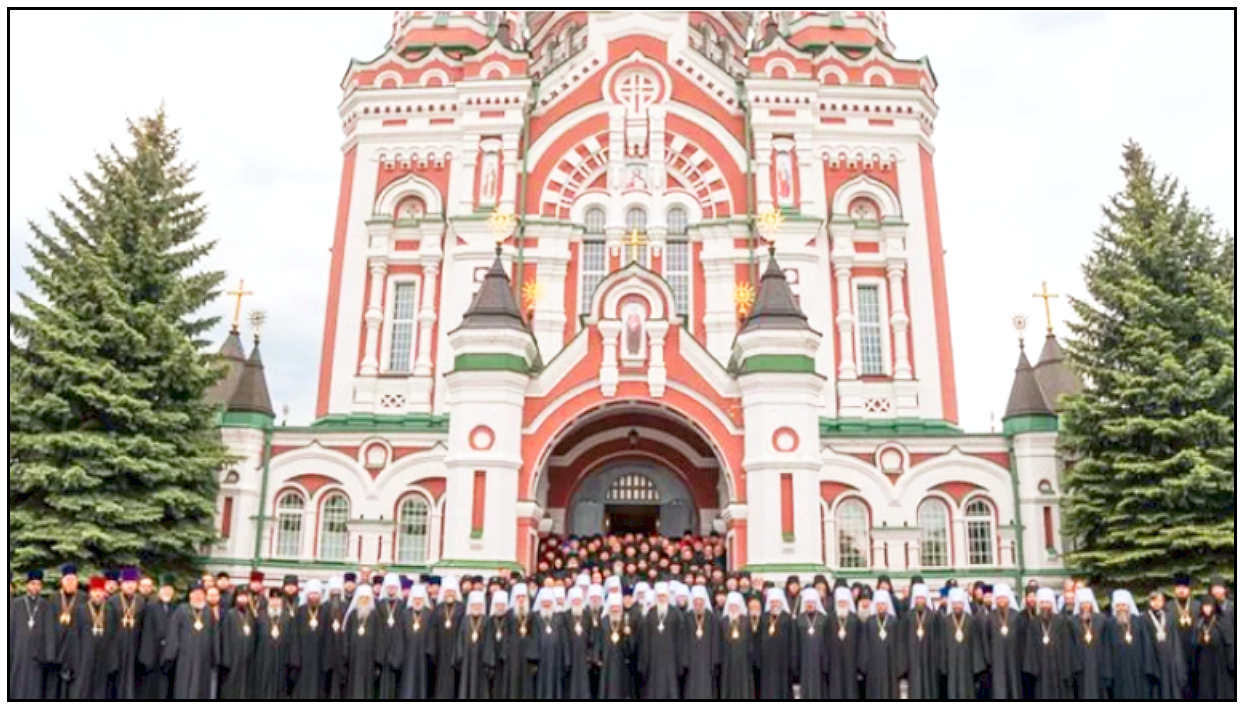Backgrounder on the Religious Aspect of the War in Ukraine
Why is the (former) UOC-MP's becoming independent from Moscow such a "big deal," as I wrote in last week's "SPECIAL EDITION: UOC Declares Independence From Moscow Patriarchate"? Religion plays a much larger part in the conflict between Russia and Ukraine than it does in the West. It is being used by Moscow as an ideological justification for their war in Ukraine, claiming that Ukraine is overrun by homosexuals and fascists, that the new OCU is not legitimate, and that only the UOC[-MP?] is the true Orthodox Church in Ukraine. But now, if the UOC has really broken with the MP due to Russia's invasion, Moscow lost that ideological prop. Here's some background information:
The difficulties and differences between the UOC-MP (Moscow Patriarchate) and the new OCU (Orthodox Church of Ukraine) go back many centuries. Cyril & Methodius, missionaries to the Slavs in the 800s, developed the "Glagolithic" alphabet for the Slavs, which soon developed into the Cyrillic alphabet, so they could translate the Bible and the Liturgy into the language of the people. But Frankish (western) church hierarchs resisted their missionary work in Bohemia, thus beginning the tension between Eastern and Western church centers in Slavic lands: see https://en.wikipedia.org/wiki/Cyril_and_Methodius.
More recently, in the late 16th century, the Roman Catholic Church became dominant in Central and Eastern Europe and formed a hybrid "Union" that allowed the Orthodox believers there to retain their eastern liturgy and married priests if they would commemorate the Pope in the liturgy as head of the Church instead of the Ecumenical Patriarch of Constantinople, calling these Christians "Uniates." the Ruthenian Uniate Church. The Moscow Patriarchate has struggled against the Uniates for centuries: the Russian Empire eventually expanded and absorbed the eastern part of Ukraine but the western part still has many "Uniates" – now called Greek Catholics.
The "Ruthenes" are the Latin name for the Rusyns, sometimes called the Carpatho-Rusyns who are found in today's southern Poland, Slovakia, Ukraine, and Hungary. When millions of them immigrated to Pennsylvania and Ohio in the early 1900s, they were still "Uniates" or more recently called "Greek Catholics" but when a Roman Catholic bishop insisted that they stop allowing priests to marry and begin using the Latin liturgy (Mass), about half of them returned to Orthodoxy. Some joined the Orthodox Church of America (started by Russia), some joined other Orthodox jurisdictions, and some started the Carpatho-Russian (Rusyn) Orthodox Church under the Ecumenical Patriarch, which we have attended for several years here in Pittsburgh. I have a copy of the Greek Catholic liturgy in which I've pasted "the Ecumenical Patriarch" over "the Pope of Rome" in 6 places, and presto! It's an Orthodox liturgy again!
For some years after WW1, Ukraine had its own autonomous Orthodox Church under the Ecumenical Patriarch but the Bolsheviks eventually took over Ukraine and exterminated those clergy, then established the UOC-MP there. This situation lasted until the collapse of the USSR when Ukraine gained its independence and a few versions of an autonomous Orthodox Church formed again. This was formalized in 2019 by the Ecumenical Patriarch recognizing the new "Orthodox Church of Ukraine" (OCU). Of course, the UOC-MP strongly resisted this, broke off relations with the Ecumenical Patriarch, calling him just "the Patriarch of Constantinople," not "Ecumenical" (Russia has long contended that it is the "Third Rome" after Constantinople fell to the Turks). Then Russia invaded Ukraine, which caused many Moscow-oriented parishes in Ukraine to join the OCU. Now the UOC is dropping the "-MP" in its name but still maintaining friendly and subordinate relations with Moscow. It's a complicated, convoluted affair: why can't Christians come together in peace, harmony, humility, and agape-love?
St. Paul preached on the Areopagus (Mars Hill) in Athens, saying that God has made "every nation of men to dwell on all the face of the earth, and has determined their preappointed times and the boundaries of their dwellings" (Acts 17:26). God sets the timeline for a nation's existence – Russia's population is projected to fall to about 80,000,000 by 2050 from the high of 148,650,000 when the USSR collapsed; abortion is the most common type of birth control and alcoholism is one of the highest causes of death in Russia. God also sets the boundaries for a nation to dwell in – why does Russia need to expand its boundaries, if its population is falling so drastically?
As Aleksandr Solzhenitsyn said when someone asked him why such terrible things took place – "The people have forgotten God, that is why such things are happening." The Epicurians and Stoics that the Apostle Paul mentioned in the above sermon on Mars Hill were philosophers that taught that life's meaning was to be found in self-indulgence or in self-control. But when we try to find the meaning of life, our existence, in "self" – whether it's pleasure or power, we come up against a dead end, circular reasoning of "it's fun to have fun" or "it's good to be good" – neither option explains the "why" of life. Only when we center our lives on the Absolute Who has revealed Himself do we find meaning and satisfaction in our fleeting existence on this planet Earth.
Go to ARC-News to read our free e-newsletters and Subscribe!


No comments:
Post a Comment